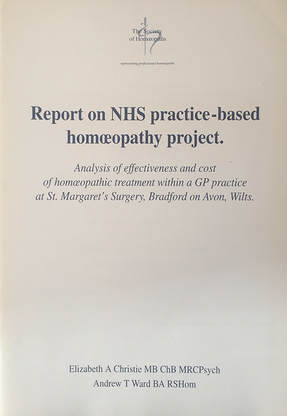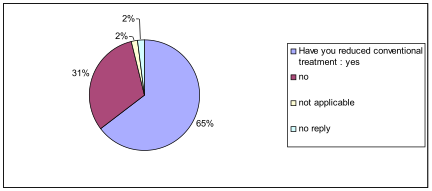HOMEOPATHY
|
My Research
|
Over the past 15 years I have conducted several research studies and audits of my NHS practice that I ran for 14 years at St Margaret’s Surgery, Bradford-on-Avon, Wiltshire. The main report was completed and published in 1996 and entitled:
|
Report on a practice-based homeopathy project analysis of effectiveness and cost of homeopathic treatment within a GP practice
ISBN 1 901262006
Published by The Society of Homeopaths
For a copy of the report (cost £10), please contact me
Published by The Society of Homeopaths
For a copy of the report (cost £10), please contact me
Results
This was a three year research project that looked at patients treated over a period of 28 months. A self-assessment questionnaire was sent out to 223 patients. To further assess the benefits to the patients and the GPs / surgery, 10% of the patient group had their medical notes assessed for the following information:
• Number of consultations with the GP in the year before receiving homeopathic treatment compared with the number in the year after
• Drug usage before and after homeopathic treatment. This included real costs of prescribing
• Estimated cost of conventional treatment eg e.g. savings on referrals to secondary care etc
There was a 60% response rate to the survey:
• 68% were very satisfied with the service
• 60% saw an improvement of 65% or more in their condition they had been treated for
• 32% had a 90% or more improvement
• 72% had a 50% or more improvement
• 72% had not needed to see their GP about their condition in the year after treatment
• 97% of respondents answered “yes” when asked has the homeopathic treatment benefited you in other ways?
Impact on GP workload
Average number of visits per patient to GP in the year before treatment = 4
Average number of visits per patient to GP in the year after treatment = 1
Cost savings
Looking at 5 case histories in-depth it was deduced that the per patient saving / per annum would be £104
Referring to the patient group who had a 60% or more improvement that amounted to an aver-age annual cost saving of £9,000. (In today’s money this would equate to £15,000)
On an average outpatient cost of £77, the savings deduced to secondary care were in the region of £3,000, a total of £12,000 (£20,000 today).
NB At the time the £9,000 savings equated to the total cost of running the service, i.e. it was SELF-FUNDING.
The GPs concluded that the study showed demonstrated “ clear and consistent evidence of the benefits of homeopathic treatment for the conditions referred”; "saved GP consultation visits and time and improved patient satisfaction”; “the per patient savings equate to the annual cost of employing the homeopath - in effect it means the project is self-funding”; “high level of patient satisfaction and benefit to the patient, the most common outcome being no consultation were needed at all in the year after treatment”.
“The cost effectiveness and success rate of homeopathy shown in this study would allow GP practices to give their patients an improved service at very little cost, whilst giving GPs extra time for other work”
A second audit was completed in 2006 and is yet to be published.
Research Project by Maureen Mounty PhD 2007 - Greenwich University
An in-depth approved and adapted medical health assessment form was sent to patients who had received homeopathic treatment at St Margaret’s Surgery, Bradford-on-Avon, Wiltshire.
• Number of consultations with the GP in the year before receiving homeopathic treatment compared with the number in the year after
• Drug usage before and after homeopathic treatment. This included real costs of prescribing
• Estimated cost of conventional treatment eg e.g. savings on referrals to secondary care etc
There was a 60% response rate to the survey:
• 68% were very satisfied with the service
• 60% saw an improvement of 65% or more in their condition they had been treated for
• 32% had a 90% or more improvement
• 72% had a 50% or more improvement
• 72% had not needed to see their GP about their condition in the year after treatment
• 97% of respondents answered “yes” when asked has the homeopathic treatment benefited you in other ways?
Impact on GP workload
Average number of visits per patient to GP in the year before treatment = 4
Average number of visits per patient to GP in the year after treatment = 1
Cost savings
Looking at 5 case histories in-depth it was deduced that the per patient saving / per annum would be £104
Referring to the patient group who had a 60% or more improvement that amounted to an aver-age annual cost saving of £9,000. (In today’s money this would equate to £15,000)
On an average outpatient cost of £77, the savings deduced to secondary care were in the region of £3,000, a total of £12,000 (£20,000 today).
NB At the time the £9,000 savings equated to the total cost of running the service, i.e. it was SELF-FUNDING.
The GPs concluded that the study showed demonstrated “ clear and consistent evidence of the benefits of homeopathic treatment for the conditions referred”; "saved GP consultation visits and time and improved patient satisfaction”; “the per patient savings equate to the annual cost of employing the homeopath - in effect it means the project is self-funding”; “high level of patient satisfaction and benefit to the patient, the most common outcome being no consultation were needed at all in the year after treatment”.
“The cost effectiveness and success rate of homeopathy shown in this study would allow GP practices to give their patients an improved service at very little cost, whilst giving GPs extra time for other work”
A second audit was completed in 2006 and is yet to be published.
Research Project by Maureen Mounty PhD 2007 - Greenwich University
An in-depth approved and adapted medical health assessment form was sent to patients who had received homeopathic treatment at St Margaret’s Surgery, Bradford-on-Avon, Wiltshire.
- Here are some of the preliminary findings -
51% had a long-standing illness:
Less contact with their GP:
Do you feel better:
Do you now cope with your condition better?
Do you now feel more healthy?
Have you reduced conventional treatment/ medication?
All details of these research findings from Andrew Ward






